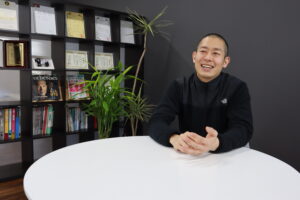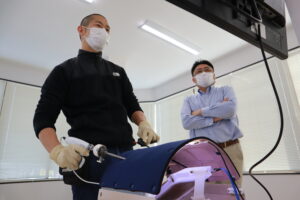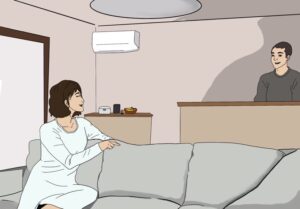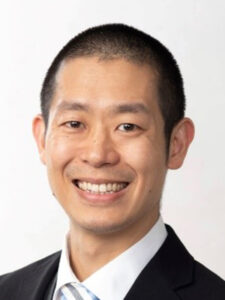Dr. Yamane: How to Improve Your Work Environment and Training (Interview Part 2)
|
As the second installment of KOTOBUKI Medical’s interview project, we interviewed Dr. Yusuke Yamane, head of the pediatric surgery team at Nagasaki University. We had the chance to talk about his efforts in surgical education, including his online “Yamane Juku” program, as well as his daily endeavors as a doctor and a father. This interview is quite long, so we’ve split it into two parts for ease of access and readability. For part one of the interview, please read our previous article.
|
Part 1 of Dr. Yamane’s Interview
Can you tell us about any new projects you’re planning?
For my next biggest next focus, I’d like to make a serious effort at establishing a “Yamane Nursery.” This would be a place for the children of doctors to be cared for at the hospital. By creating this project, I hope to support the career development of junior employees who have families.
Next, there’s an initiative, or rather, a mindset that I would like to create. This is more on a personal note.
Both of my children are boys, and if they get married in the future, I hope to create a mindset that makes it easy for their partners and children to visit the family home.
I think in Japan, it’s easier for women to go back to their parents’ home and men tend to avoid their parents’ home. This is just as true for married couples. I want to create a mindset that makes it easy for my sons to come home. I also hope I can build an environment in which my sons’ partners and children can feel as comfortable at our home as if it were their own.
Many people in Japan encourage their children to visit home, but end up not playing with the grandchildren when they do come home.
My goal for the future is to become a grandfather who engages with his grandchildren and plays with them a lot. (laughs) To achieve this goal, I’ll continue building my physical strength.
Also, the people who will be my sons’ partners will enter the family as strangers initially. But, I hope to establish healthy relationships and boundaries without nagging or bothering them.
I consider it the same as interacting with the junior staff members I train. I don’t nag them about tasks they haven’t completed. Rather, I try to be considerate of their circumstances first. This is the same mindset I hope to employ in my family life with future children-in-law.

There’s also a book I’m working on. I have co-authored a book before, but this is the first time I am publishing independently. I’m very excited about it. The audience I’m writing for will be medical students and trainees. Hopefully, the how-to’s on surgical procedures will encourage readers to join surgery after reading the book.
Finally, as another personal goal, I’d like to eventually try a full 42-kilometer marathon. I think the experience of running for six hours will have a positive impact on my work.
The shortage of doctors, especially surgeons, has been talked about a lot in recent years. What do you think the core problems are? What would you do to address them?
Well, it’s probably that people don’t want to join the field. It’s really tough.
You have to have a genuine love of surgery to join the surgical department. What’s more, many new entrants who want to go home on time will find it harder to advance their careers. This may not be ideal for achieving a good work-life balance, but it can be necessary.
In the case of female doctors, I hope we can encourage male doctors and even unrelated male partners to participate more in housework and childcare. This would make the career more accessible for female doctors.
If the number of surgeons increases, I believe the barriers to entering the field will also be lowered.

Where do you see yourself in the next ten years?
Since my value as a single-focus pediatric surgeon will inevitably decline over the years, I need to increase my value as a surgical educator.
It’s my hope to support the younger generation and create an environment in which they can organize strong teamwork and stay up-to-date in the changing world of surgery.
Also, in the near future, my youngest son will start high school. If he ends up attending a school outside of our prefecture, it’ll be just my wife and I for the first time since we were newlyweds.
Well, by that point we’d be more like seasoned warriors than newlyweds.
My wife is a huge fan of video games like Splatoon. I, on the other hand, prefer to read or play Tsume-Shogi, which I just started last year. I imagine us in 10 years playing our favorite games as we sit next to each other in peace.

I also have a dream to make Yamane Cram School more like a real cram school. I’d love to create a facility in which students can take in-person classes, or online courses if they prefer.
After all, this is how real cram schools operate. I’d also like to open classes to the general public more, maybe open up some lectures to high school students.
Takayama: It would be great to have a branch of the Yamane Cram School here in our headquarters. I’d like to set up a studio for you.
Why stop at a branch? We could make KOTOBUKI Medical the main school! (laughs)
Right now, private medical offices are making efforts to systematize surgical education. If systematic surgical education can be generalized, there will be a need for smaller schools to teach more focused disciplines and techniques.
Online learning is of course important and useful, but real-life training is always necessary for the long run.
Online training is like learning how to swing your bat, but on-site learning is more like a batting center. I hope Yamane Cram School will be like a batting center for students, where they can gain plenty of knowledge and experience before they head into the game.

Finally, do you have a message for young doctors and students?
At the risk of sounding harsh, I have the impression that this next generation isn’t used to being angry.
I would encourage younger doctors and students to take on more challenges without being afraid of being rebuffed by others or feeling angry about the results.
Also, I think it’s important for those with families to put effort not only into their work but also into their home lives. For those who live alone, I think it’s important to focus on making that home you have better for yourself.
Running a home requires some multitasking, so focusing on how you manage time is important.
If you don’t have your home life sorted out, you might not be working at the office well either.
Output is also very important. If you’re learning something new, it will stick better if you share what you’ve learned with colleagues, transmit it to your media circles, or even present it at conferences. Be adventurous. When you try to output what you have learned, you may unexpectedly rediscover things that you didn’t know before.
I also recommend focusing on your communication with others in the workplace and at home. For example, my wife secretly adds water to the miso soup I make and my second son writes his homework essays about how “Dad’s miso soup is too thick.” (laugh)
I don’t let these things bother me, and make every effort to show gratitude to my family.
Unlike baseball, it’s hard to set clear goals for skill development in surgery. So, it’s important to map out your own goals that suit your style and stick with them.
I believe that many doctors are so busy with their daily duties that they feel they can’t take time to improve their skills. I encourage you to incorporate training time into your daily routine.

Dr. Yusuke Yamane
Affiliations:
Department of Oncology, Nagasaki University Hospital
Head of Pediatric Surgery Team, Nagasaki University
Dr. Yamane graduated from Nagasaki University School of Medicine in 2005. He joined the Department of Oncology in Nagasaki University Hospital in 2007 and worked at Oita Prefectural Hospital. Afterward, he entered Sasebo General Medical Center, then joined the Department of Pediatric Surgery at National Center for Child Health and Development in 2009. He returned to Sasebo General Medical Center in 2011 and to Nagasaki University Hospital in 2013. His hobbies include Shogi (Japanese chess), horse racing, surgery, and surgical education.